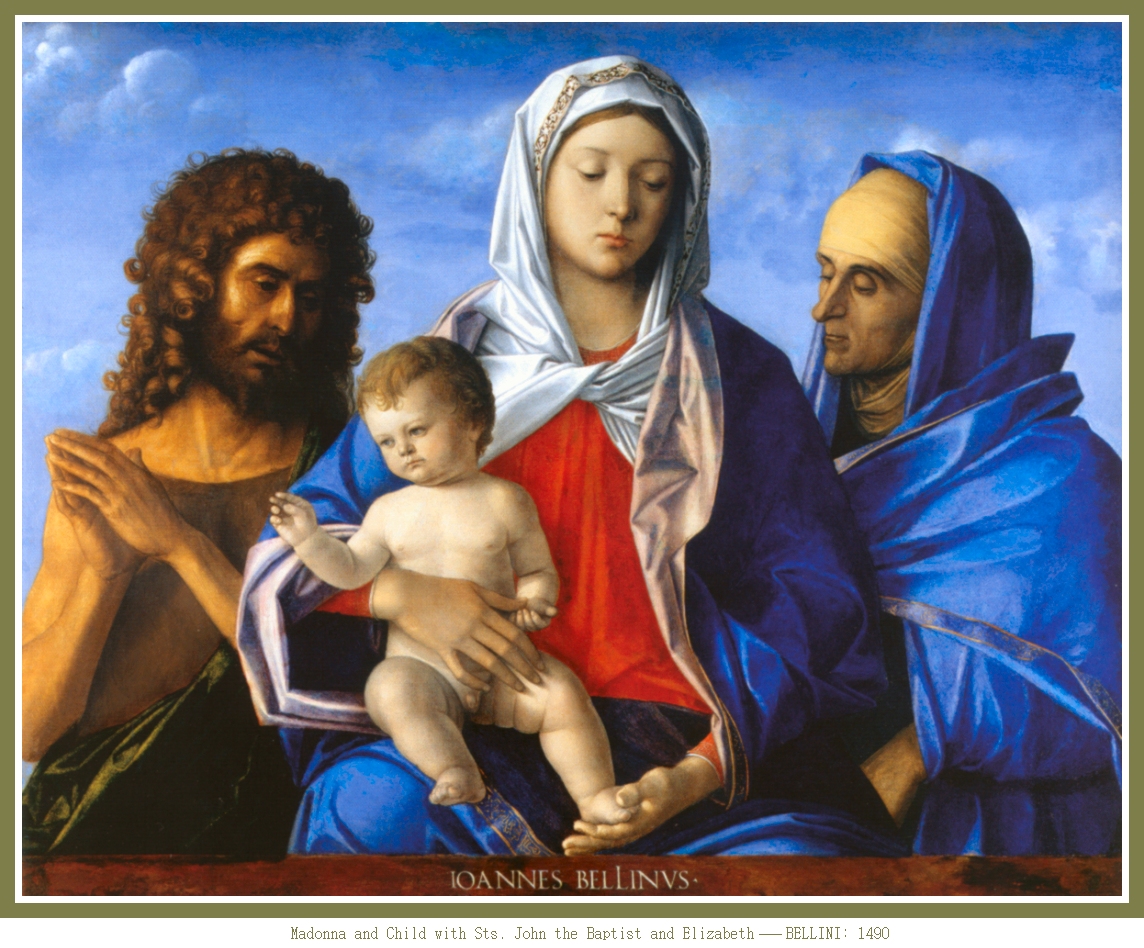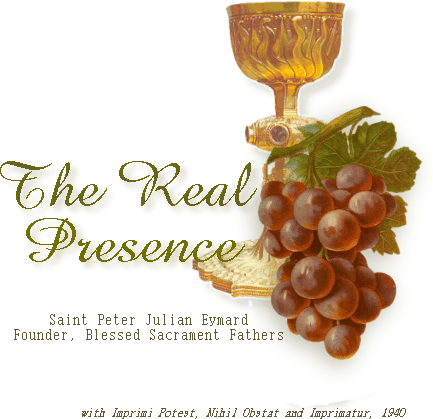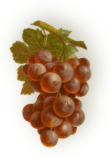

ST. JOHN THE BAPTIST
Illum oportet crescere, me autem minui.
He must increase, but I must decrease. (John iii. 30.)
WE SHOULD honor Saint John as a perfect model of adorers. The following beautiful words are the motto of Eucharistic devotedness and service: May the Most Blessed Sacrament increase; may it be known and loved; and may we become as nothing at the feet of our Eucharistic Lord! See how Saint John in the principal actions of his life is a model of adorers. His life seems to have been but one uninterrupted adoration, in which we find the characteristics of the best method of adoration: adoration according to the four ends of the Sacrifice.
I
ADORATION.-----We begin our adoration by bowing the head and prostrating ourselves to the ground. Through this first act we give recognition to the infinite majesty of the God Who is hidden beneath the Eucharistic veils. We follow this up with the exaltation of His greatness and love.
Saint John's first grace was one of adoration. The Word was in Mary's womb. He inspired His Mother to visit Elizabeth; Mary carried to John his Master and King. John could not come, for his mother was too old to undertake that journey; Jesus Christ went to him. He did the same for us: we could not go to God; God came to us.
When Mary "saluted" Elizabeth, she loosened the power of her Divine Son. Today Jesus is still bound and will do nothing without Mary. The Word Incarnate spoke through the voice of Mary. At the sound of that voice John leaped in the womb of his mother and revealed to her the mystery of God's presence in Mary. It is John who made Elizabeth understand this mystery, as she herself confessed to Mary: Exsultavit in gaudio infans in utero mea. "The infant in my womb leaped for joy."
At that moment John became the precursor of Christ. He saw his God and adored Him by leaping for joy. He adored Him, and the joy of finding himself in His presence reacted on his mother.
How good our Lord was to John! He wanted to bless him and make Himself known to him from His mother's womb. How pleasing to Him the adoration of His precursor must have been! It was so spontaneous!
Jesus stayed with him three months. They were both hidden within the maternal tabernacle. John constantly adored his God; he felt His hidden presence. Join in Saint John's adoration, which was so real and heartfelt in spite of the veils and barriers that separated him from his Lord. Senseras Regem thalamo manentem. "Thou didst sense the King abiding in His nuptial chamber."
II
THANKSGIVING.-----Thanksgiving is based on the love and goodness of Jesus Christ. It sees only His gifts and blessings. The grateful soul humbles herself in order to exalt her Benefactor. She rejoices for herself as also for the blessings and favors granted to others, to the whole Church.
This feeling gladdens the heart. John manifested this twofold feeling of joy and of gratitude at the Jordan. Notice first of all the grace with which our Lord favored him; for thanksgiving is always born of a favor received and is based on humility. Now, John was on the point of Baptizing our Lord. He had not as yet ever seen Him. The Heavenly Father had given him a sign by which to recognize Him. Jesus presented Himself in the crowd of sinners who were waiting for John's Baptism and were listening to his austere exhortations to penance. Jesus waited for His turn along with publicans and soldiers, He, a King, the Son of God! He claimed no privileges or exceptions. Understand that well, O adorers, and have no protector other than our Lord. Saint John cast himself at the feet of Jesus Christ. "What is this? I ought to be Baptized by Thee, and comest Thou to me?" Ego a Te debeo baptizari et Tu venis ad me? That is humility and truth! The Saints never think themselves perfect. And John does not speak of his ministry. Venis ad me? "Comest Thou to me?" He does not say: "Comest Thou to my Baptism?"
What delicacy of feeling! Mentioning his ministry would have set up a little throne for himself; but there must be nothing of that in the presence of our Lord.
And Jesus Christ said to him: "Proceed. Carry out My Father's orders." Like a truly humble man, John obeyed and baptized Him. A lesser humility would have advanced fifty reasons not to, but John obeyed. And when our Lord withdrew, he did not follow Him; he remained at his post of duty. What humility!
See how he returned to our Lord all the honor and glory of the sublime function he had just performed. His disciples, the worst kind of flatterers, who sought their own glory in that of their master, pointed out to him that everybody was following Jesus. "Oh! How happy you make me!" replied Saint John. The friend of the Bridegroom remains close to Him and stands in front of Him, but the bride is for the Bridegroom only. The souls are for Jesus Christ only. The friend is there only to wait on the Bridegroom. John was happy to see the Divine Bridegroom find so many loving souls. "This my joy is fulfilled on seeing Him increase. He must increase, but I must decrease!"
Nothing for himself, everything for Jesus! To make our Lord increase should be the object of our endeavors. What a pity we can not erect a throne for Him in every heart! We bow down before our Lord, we decrease, and we raise our Lord up on His throne. Oportet Illum crescere. "He must increase." In practice this is far-reaching. Today we are insignificant, but some day there may be remarkable men among us adorers. Oh! It is then they will have to be told: "Be very careful! Do not stand on the tip of your toes! Do not pride yourself on your talents! Lower yourself so that the Master alone may appear!" Our vocation is so beautiful and its aim so exalted I People will suppose we have all the virtues, as indeed we should to be worthy of our vocation. Woe to him that wants to remain standing in the presence of our Lord! No! Down on your knees! Down to the ground! Oportet Ilum crescere, me aut em minui. "He must increase, but I must decrease!"
Oh! What a good thanksgiving is that of a soul who accepts the gifts of God, but acknowledges she had no hand in them and refers all the glory to God!
III
PROPITIATION OR REPARATION.-----Propitiation consists in making amends to our Lord and in consoling Him. That is what our mission as adorers largely consists in. We ought to make reparation; we ought to be mediators and penitents for the sins of men. The world is so wicked that there is almost greater need of reparation than of thanksgiving.
John made reparation when he said: Ecce Agnus Dei, ecce qui tollit peccatum mundi. "Behold the Lamb of God, behold Him Who taketh away the sin of the world." He preached and showed the atoning Victim. He wept and sorrowed over the indifference of men toward the Savior. Listen to his complaint: Medius vestrum stetit, quem vas nescitis. "There hath stood One in the midst of you, Whom you know not." He grieved to see that the great and learned refused to follow Jesus Christ, Who was surrounded only by a few poverty-stricken people. He made public amends to Him and adored Him as Victim. He exalted Him for those who despised Him: "But I am not even worthy to loose the latchet of His shoe! " How well he makes up for man's disdain!
IV
SUPPLICATION OR PRAYER.-----John had been thrown into prison for his courage in rebuking a guilty king. We hardly dare tell the plain truth to kings; we are afraid. What a sorry plight. it is for one to live with kings! Some disciples who did not yet believe in Jesus Christ came to see John in prison. John did his utmost to effect their conversion. That is the true apostolate: bringing back souls to Jesus Christ and binding them to Him alone without any thought of self-interest. John asked our Lord to receive them. He sent them to Him that the sight of His kindness and power might convert them. Jesus Christ showed them the greatest miracles; but they did not adore Him. Oh!
How stupid is the human heart when it is infected with prejudice! Their envy suggests to them that if Jesus increases, John will lose prestige. They do not want to decrease with him. Theirs is a pride of caste, pride of clique; they thrive on the glory that surrounds their master.
However, this visit to our Savior sowed the grace of faith in their hearts, and after Saint John's death they came to our Lord. Their conversion was due to Saint John's prayers.
Saint John was a good adorer. You should love him since our Lord loved him so much. Our Lord mourned his death; for John was His cousin, His friend, His first apostle. Adore and make reparation like Saint John. Be ready to sacrifice yourself like him for our Lord's glory. John died martyred by the crimes which stir up God's anger the most: the crimes of a king. And never forget these words which are the motto of Eucharistic service and holiness: Illum oportet crescere, me autem minui. May Jesus Hostia be exalted, and may I be humiliated!
VIEW DETAIL OF THE IMAGE
 Contact Us
Contact Us
HOME---------------THE HOLY EUCHARIST DIRECTORY-----------------------BLESSED SACRAMENT VISITS
www.catholictradition.org/Eucharist/real-presence46.htm